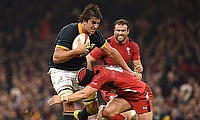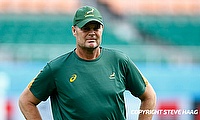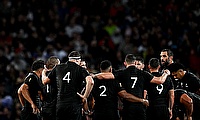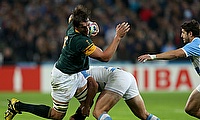Is Peter de Villiers looking to change his approach?
The end of this year's super rugby brings forth another tournament that most rugby fans in the southern will be looking at with close interest, especially because this is a world cup year. Most people will be swearing that the winner of this year's Tri-nations tournament will be the finalist at the world cup. The super rugby has in most seasons, been an unreliably indicator of the country which will most likely be strongest contender for the southern hemisphere test league. So most analysts look at the strongest teams in each country as most players that will represent that country will be selected from them.
Taking a look at the South African conference this season, the Stormers are leading the way into the business end of the competition. They, of all South African teams, have been the most consistent in performance; they have won 11 of their 14 matches to date which is the same as the combined super rugby log leaders the Queensland Reds who edge them with one bonus point with two matches before the knockout stage. Looking closer at the Western cape outfit it's easy to notice that they don't let too many tries in, they don't score too many either. So clearly theirs is game plan whose strength lies in defence. This brings me back to a statement that was made by Peter De Villiers, the Springbok coach when he said something along the lines of "tournaments like the world cup are not won by playing expansive attacking rugby but rather by playing a defensive game
The current Stormers performance is testimony that de Villiers's approach is effective in a high paced competition like Super Rugby. But the question is: will it work in a test format? Looking back to the best Springbok performance under PD, the Tri-nations series win of 2009 the statistics can go either for or against his point. The Springboks scored 10 tries and conceded only 11 in the 6 matches they played, this was also the highest tally for and against (this is the against part) for all three teams in the competition, which means that tries constituted to just over 31% of the points scored by the Springboks in the tournament, which is where stats favour his point. In 2009 de Villiers had the luxury of selecting as many as 4 capable kickers on the field at the same time in Morne Steyn, fourie Du Preez, Ruan Pienaar and Frans Steyn who came in useful at certain stages of the Bok victory in Hamilton. This season however, Frans Steyn is not on the springbok line-up and Du Preez's form is in doubt as he has had to miss a few matches for the Blue Bulls and nothing is being said about Pienaar. Looking at the 51 man training squad that was named in April, the only kickers besides Morne Steyn, who are currently in form, or at least in starting line-ups at their respective teams are all in the fly-half position in Patrick Lambie and Elton Jantjies, Jantjies, who has developed a habit of taking long range kicks at goal. But both these young talents are most likely to start off the bench because of the more experienced Steyn.
The forward pack has not been tempered with which means that he is not moving away from the physicality in that division, while when you look at the mid-field, he has kept the experienced pairing of Jean de Villiers and Jacques Fourie with Juan de Jongh, Adrian Jacobs, Peter Grant and Waylon Murray as possible replacement. All these replacements have a knack for finding gaps in the defence and making the off-load to a speedster on the outside to finish off the opposition. And speedsters there are, and plenty of these, along with some attack minded full backs in Zane Kirchner, Conrad Jantjies and the versatile Gio Aplon.
This brings these questions to mind: given the kind of players that have been selected in the Springboks, is Peter de Villiers changing his tactics? Is he looking to play a more attacking game plan in the upcoming Tri-nations and eventually the World cup? Was he calling a bluff when he criticised the Graham Henry's approach? With Peter de Villiers, one can never be sure, only time will tell








.jpg)